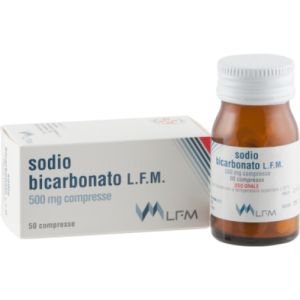Ship in Europe, Find out rates!

Sodium Bicarbonate Milanese Pharmacological Laboratory 50 Tablets
LAB.FARMACOLOGICO MILANESE
Therapeutic indications
Short-term treatment of gastric hyperacidity.
Dosage
Adults The usual dose in adults varies between 500 mg to 5 g per day. Adolescents (12-18 years) 1-2 tablets after meals and at bedtime. The medicine is not suitable for children under 12 years of age.
Overdose
Experience with deliberate overdose with oral sodium bicarbonate is very limited. The only possible consequence of overdose is abdominal distension caused by excess carbon dioxide generated by the breakdown of sodium bicarbonate in the stomach. In this case, symptomatic treatment should be resorted to by adopting generic supportive measures.
Contraindications
• Hypersensitivity to the active substance or to any of the excipients. • Severe kidney failure. • Respiratory alkalosis. • Hypocalcaemia, due to an increased risk of tetany. • Diuretic-induced hypochloremia (see section 4.5). • Excessive loss of chlorine, due to vomiting or continuous gastrointestinal sucking, due to the increased risk of metabolic alkalosis. • Children under the age of 12. • Generally contraindicated in pregnancy (see section 4.6).
Side effects
The following are the undesirable effects of orally administered sodium bicarbonate, organized according to the MedDRA system organ class. Insufficient data are available to establish the frequency of the individual effects listed. Immune system disorders Allergic manifestations such as urticaria and bronchospasm, anaphylactic or anaphylactoid reactions. Gastrointestinal disorders Stomach cramps, flatulence, vomiting and gastric lesions. Vascular disorders Fluid retention (edema), especially in elderly patients and in the presence of cardiac or renal insufficiency. Sodium bicarbonate when administered orally at recommended doses is absorbed only in small amounts with minimal systemic effects. However, adverse reactions due to a systemic effect of the drug are listed below. Metabolism and nutrition disorders Metabolic alkalosis, especially in patients with renal insufficiency; Symptoms include shortness of breath (for compensatory hyperventilation, which can last up to 48 hours), muscle weakness associated with potassium depletion, muscle hypertonus, muscle spasms and tetany which can occur especially in hypocalcemic patients. Hypernatremia. Hyperosmolarity, with increased fluid volume and pulmonary edema Cardiac disorders Decreased cardiac output. Vascular disorders Hypotension. Cerebral edema. Intracranial hemorrhage. Respiratory, thoracic and mediastinal disorders Hypercapnia.
Pregnancy and breastfeeding
Pregnancy For sodium bicarbonate, no clinical data on exposed pregnancies are available. Animal studies do not indicate direct or indirect harmful effects with respect to pregnancy, embryonal / fetal development, parturition or postnatal development (see section 5.3). Caution should be exercised in prescribing the medicine to pregnant women. Furthermore, it should be considered that the sodium contained in the medicine can worsen the oedematous states of pregnancy. Therefore, for the treatment of stomach acid, it is recommended to use alternative drugs that do not contain sodium. Breastfeeding The use of sodium bicarbonate is considered compatible with breastfeeding.
Special warnings
Particular caution should be exercised in administering sodium bicarbonate in case of: • history of congestive heart failure; • renal impairment; • hypertension; • cirrhosis of the liver; • concomitant use of corticosteroids (see section 4.5). The tablets contain sodium, therefore this must be taken into consideration in cases where a particularly low-salt diet is recommended, for example in some cases of congestive heart failure, renal impairment, hypertension. Sodium bicarbonate should be used with caution in case of anuria or oliguria, due to the increased risk of sodium retention. In addition, caution should be exercised in oedematous conditions with sodium retention, such as liver cirrhosis, congestive heart failure, renal failure, toxemia or pregnancy. In patients with very low stomach acid levels, sodium bicarbonate may be less effective on stomach acid. Furthermore, in these subjects there is the possibility of an increase in its absorption into plasma with the possibility of undesirable systemic effects. In patients presenting with potassium depletion, sodium bicarbonate should be administered with caution and cardiac and electrolyte parameters should be monitored repeatedly. In patients with gastric and small bowel inflammation or renal insufficiency, sodium bicarbonate increases the risk of excess blood sodium levels. Sodium bicarbonate can cause changes in the pH of the stomach and urine, thus altering the processes of absorption and elimination of many drugs (see section 4.5). It is advisable to allow at least 2 hours between taking sodium bicarbonate and taking other medications. Important information about some of the ingredients : no information
Expiry and Retention
Do not store above 30 ° C. Store in the original package, tightly closed to protect the medicine from humidity, as sodium bicarbonate decomposes slowly in the presence of humidity.
Active principles
One tablet contains: Active ingredient: 500 mg sodium bicarbonate. For the full list of excipients, see section 6.1.
Excipients
Excipients: cellulose powder, microcrystalline cellulose, PEG4000, magnesium stearate.
| Destination | Cost | Detail |
|---|---|---|
| Italy | €5,90* | 24/72H |
| Austria, France, Germany, Slovenia | € 13* | 3 days |
| Belgium, Luxembourg, Portugal, Netherlands, Spain | € 14* | 4 days |
| Bulgary, Cechia, Hungary, Poland, Romania, Slovakia | € 19* | 5 days |
| Denmark, Estonia, Finland, Ireland, Lithuania, Latvia ,Sweden | € 22* | 5 days |
| United Kingdom, Switzerland, Greece | € 30* | 7 days |
| Canada, USA | € 40 | 7 Days |
European shipments with express courier: FedEx, MBE, DHL
*For the shipment outside band B ther's an extra cost of 22€ *For the shipment outside band C ther's an extra cost of 30€ Delivery Times exclude Saturday and Holidays
For Islands and Areas of difficult Accessibility the shipments are made in 72 hours and the cost will be increased by 15€